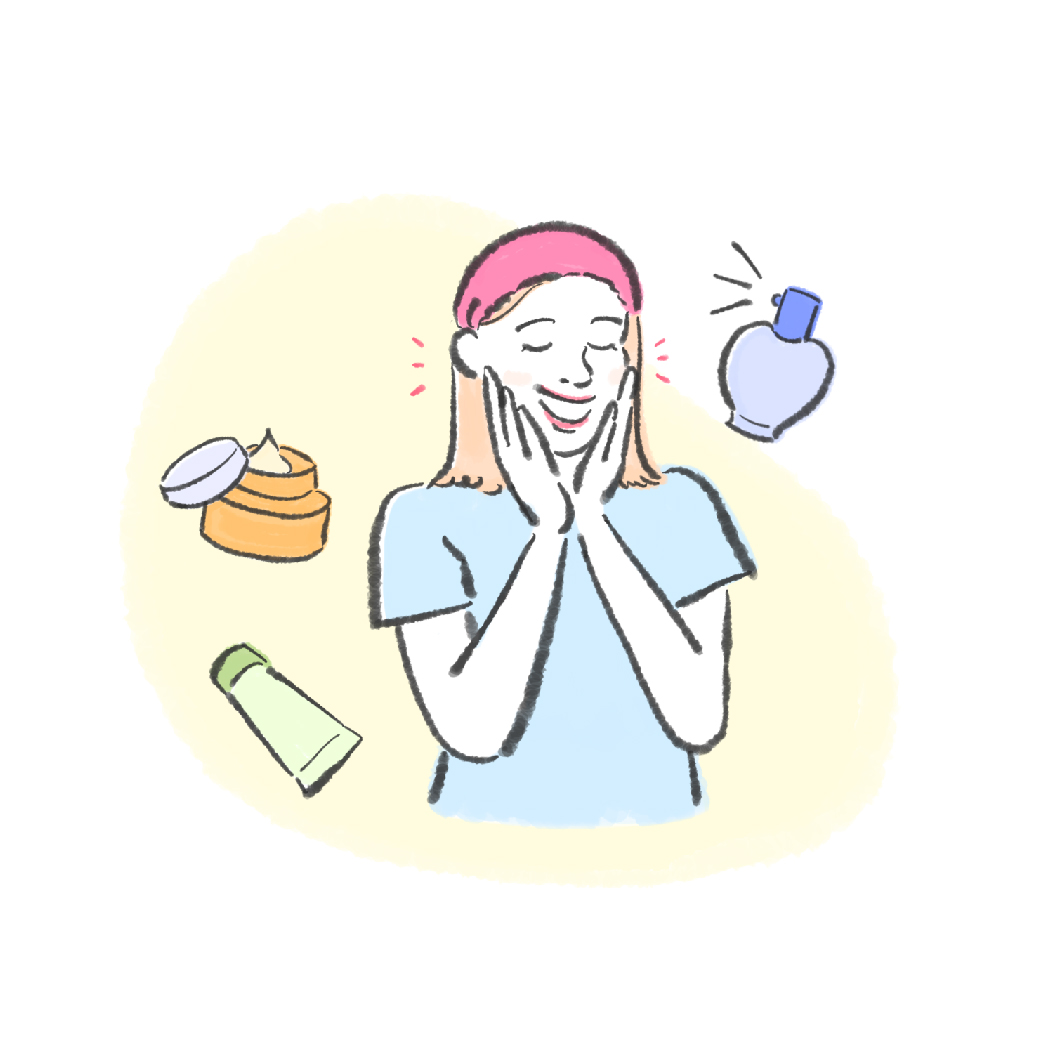
Why does pollen cause skin irritation? Symptoms and prevention methods explained
SUMMARY
- ・Rough skin caused by pollen "Pollen dermatitis"
- ・How to prevent pollen dermatitis
- How to cure pollen dermatitis
- ・Be careful not to make pollen dermatitis worse
- ・Makeup during pollen season
- ·summary
Many people suffer from rough skin not only in the dry winter but also in the spring. If your skin condition worsens every spring, you may have pollen dermatitis.
In this article, we will explain about pollen dermatitis.
Pollen-induced skin irritation "Pollen dermatitis"
The skin irritation caused by an allergic reaction to pollen is collectively called pollen dermatitis.
Here we will explain the symptoms and causes of pollen dermatitis, as well as how to distinguish it from other types of dermatitis. Be sure to understand the symptoms of pollen dermatitis so that you can deal with it properly.
Symptoms of pollen dermatitis
The most common symptom of pollen dermatitis is itchy skin during pollen season. Other symptoms such as redness and a feeling of heat may also appear.
If these symptoms only appear during pollen season every year, you should suspect pollen dermatitis. Hay fever is often thought of as causing symptoms in the eyes and nose, so if symptoms are only seen on the skin and not in the eyes and nose, you may not realize that pollen is the cause.
During pollen season, you should pay attention not only to whether you have itchy eyes or a runny nose, but also to the condition of your skin.
Causes of pollen dermatitis
Pollen dermatitis occurs when pollen comes into contact with the skin when the skin's barrier function (preventing evaporation of moisture from inside the skin and protecting the body from external stimuli) is weakened.
The main cause of the weakening of the barrier function is dry skin. If dry skin is exposed to an environment with a lot of pollen, pollen dermatitis may occur even if the symptoms of hay fever are not present in the eyes or nose.
It is important to be mindful of moisturizing your skin not only during the dry winter air, but also in early spring when pollen is flying and can put a strain on your skin.
How to distinguish it from other skin diseases
Pollen dermatitis is characterized by symptoms that tend to appear on areas such as the neck and face, where pollen tends to adhere.
The surface of pollen dermatitis is not wet like eczema, but is often dry. In addition to rough skin, it can also be accompanied by a stinging pain.
If these symptoms appear during pollen season, you may have pollen dermatitis.
Cedar pollen is most prevalent from February to April, when the weather is also prone to dry skin, so you need to be extra careful.
How to prevent pollen dermatitis
Symptoms of pollen dermatitis can be reduced by taking appropriate measures.
Here are four effective ways to prevent pollen dermatitis. If you suffer from rough skin every year during pollen season, try these preventative methods.
Do proper skin care
Proper skin care is an effective way to prevent pollen dermatitis.
Skin care helps keep the skin hydrated and maintains the skin's barrier function. To maintain the skin's barrier function, avoid washing your face with water that is too hot or scrubbing.
Frequent putting on and taking off of masks and blowing your nose can also irritate the skin. People with hay fever should be especially careful as they often put a strain on their skin.
It is effective to moisturize your skin properly after washing your face or taking a bath to prevent your skin from remaining dry.
Prevent pollen from touching your skin
To prevent pollen dermatitis, it is effective to prevent pollen from coming into contact with your skin. Wear a mask, glasses, and a hat to reduce the amount of exposed skin.
If you can't wear a mask or long sleeves, it's effective to apply sunscreen to exposed skin.
When you get home, brush off any pollen that may be on your clothes or hair before going indoors. If you want to prevent pollen from getting inside the house, it is recommended that you avoid materials that pollen easily adheres to, such as cotton or knit, and choose clothes made of smooth materials.
Improves intestinal environment
Keeping your intestinal environment in order is also effective in preventing pollen dermatitis. Although it may seem that the intestines have nothing to do with the condition of your skin, a healthy intestinal environment will boost your body's overall immunity, helping to maintain the skin's barrier function.
If you want to improve your intestinal environment, avoid oily foods and eat a diet that does not put a strain on your stomach. Dairy products and dietary fiber are also effective in improving your intestinal environment.
If you want to suppress the symptoms of pollen dermatitis, it is recommended that you consume these in moderation.
● Live a regular life
Living a regular life can boost your immunity and prevent pollen dermatitis.
Getting quality sleep at the same time every day will help improve your immunity. Lack of sleep and stress can weaken the skin's barrier function, so try to avoid staying up late and living a stressful life as much as possible.
In addition, vitamins and protein are nutrients necessary for skin recovery, so it is also important not to skip meals.
How to cure pollen dermatitis
To treat pollen dermatitis, it is effective to use antihistamines, oral allergy medications, and topical ointments to relieve inflammation and itching. If you suspect you have pollen dermatitis and your skin is rough, visit a dermatologist to get a prescription for medication.
If you undergo a thorough examination at a hospital, they will be able to find out in detail whether pollen is really the cause of your skin irritation, and which pollen you are allergic to.
If you don't see any improvement with the measures you can take yourself, consider seeking medical help.
What to be careful of to prevent pollen dermatitis from worsening
If pollen dermatitis is left untreated, it may worsen and further symptoms may appear.
Here are four things to keep in mind to prevent pollen dermatitis from getting worse. Deal with pollen dermatitis appropriately and treat it early.
● Do not irritate
In order to avoid worsening skin irritation caused by various factors, including pollen dermatitis, it is important not to stimulate the skin more than necessary.
If you rub your face too hard when washing it because you are concerned about the rough spots, it will put a strain on your skin and lead to a weakening of the barrier function. Even if you feel itchy, try not to scratch it and use topical ointments to suppress the itch.
When moisturizing with lotion or milk, it is important not to rub too hard, but to apply gently with the palm of your hand.
● Clean your room regularly
Pollen dermatitis doesn't just occur outdoors: Pollen on clothes and hair can also get airborne, causing symptoms of pollen dermatitis indoors.
Pollen that enters the home falls to the floor, so if you regularly clean and remove it, you can prevent pollen from remaining indoors.
Avoid using a vacuum cleaner, as the air will move and stir up pollen during use. To clean without stirring up pollen, we recommend using a dust cloth or floor mop.
● Be mindful of your vitamin and protein intake
To keep your skin in good condition, it is effective to consciously consume the nutrients necessary for skin production. A lack of protein can lead to disruptions to skin turnover. Be sure to actively consume fish, meat, dairy products, and other foods that contain high-quality protein.
In addition to protein, vitamins B2 and B6 are also effective in improving skin condition.
Avoid skipping meals, and aim to live a balanced lifestyle that doesn't lower your immunity by taking in a balanced amount of protein, vitamins, and dietary fiber to regulate your intestinal environment.
● If it gets worse, consider visiting a hospital.
Leaving your skin in a rough state can make your symptoms worse. If your symptoms do not improve even after taking proper skin care measures and preventing pollen from coming into contact with your skin, you should see a doctor. If you do, a blood test can be performed to identify the substance causing your allergy, leading to appropriate treatment.
Pollen-related allergic reactions can be expected to improve with drug therapy, and appropriate treatment can also be provided if there is an underlying disease other than pollen dermatitis.
Make-up for pollen season
Some people may be concerned about whether it is okay to wear makeup when their skin is irritated by pollen.
If the symptoms are mild, makeup can help to alleviate the symptoms of pollen dermatitis, as it has the same effect of protecting the skin from pollen as sunscreen. Also, be sure to use gentle cosmetics so as not to irritate the skin.
Using highly moisturizing products will help maintain your skin's barrier.
summary
The rough skin you experience in early spring could be pollen dermatitis, an abnormality in the skin caused by an allergic reaction to pollen.
To prevent skin irritation caused by pollen, it is effective to take measures such as boosting your immunity and taking measures to prevent pollen from touching your skin. In addition to covering your skin with glasses or a mask, applying sunscreen also helps protect your skin.
If symptoms do not improve even after using over-the-counter medications, it may be that the condition is something other than pollen dermatitis. If you are worried, get examined at a hospital as soon as possible.
Article supervision

Director of Mizutani Dermatology Clinic
Professor Haruko Mizutani
Mizutani Dermatology Clinic
Graduated from Tokyo Medical University. After working in the dermatology department of Tokyo Medical University Hospital and the Tokyo Cosmetic Dermatology Clinic, he opened Mizutani Dermatology Clinic in 2012.








